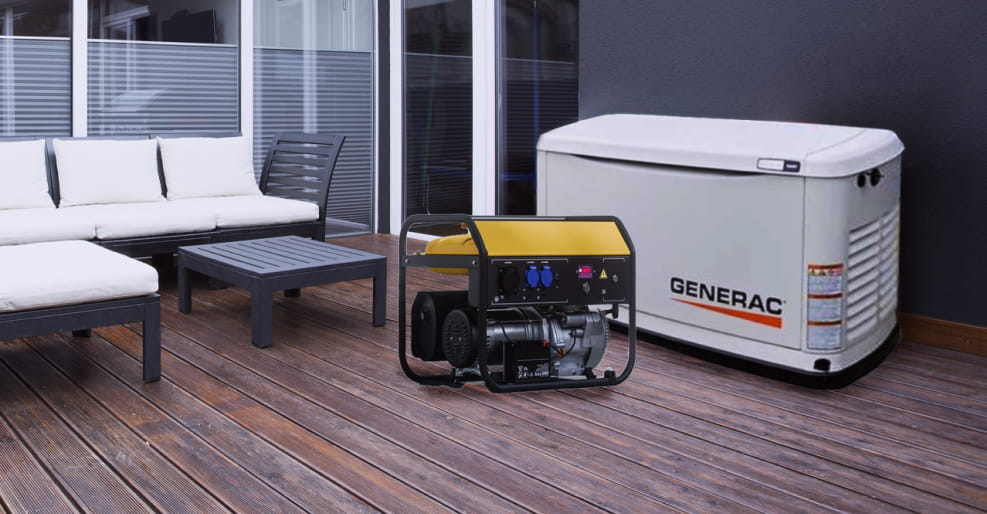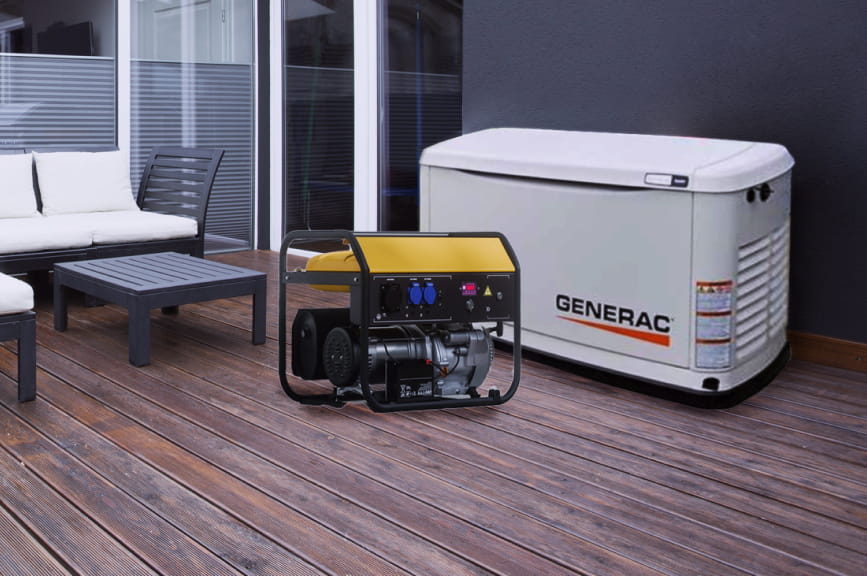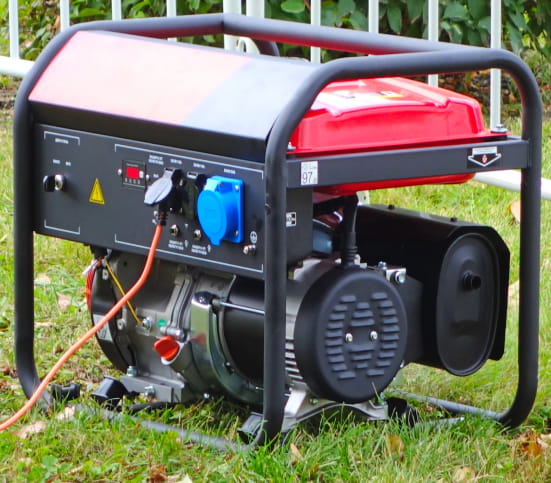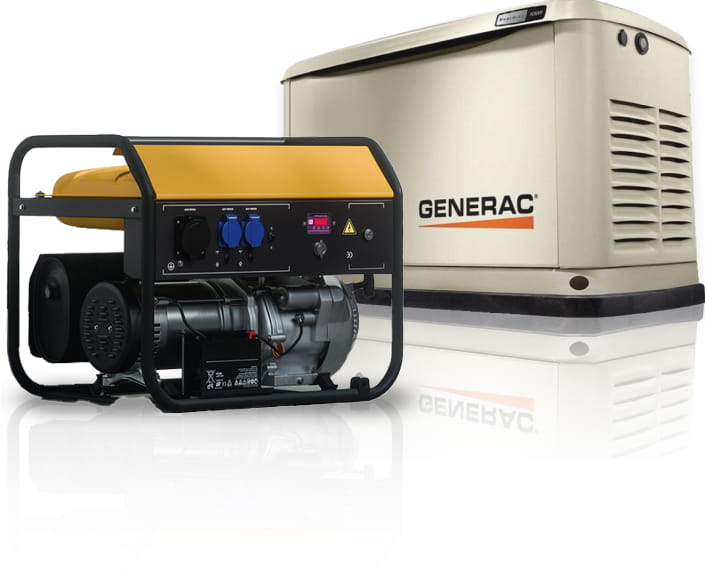

How do you decide what type of generator is best for you? Here are some tips.
From coast to coast, power interruptions are becoming more common. The majority of weather-related outages are caused by thunderstorms, with hurricanes causing the longest-lasting outages and heatwaves accounting for additional outages.*
Regardless of the cause, nobody enjoys being without power. With more people working from home, an outage can be more than an inconvenience; it can hinder productivity and even lead to lost wages or damage your personal equipment if a power surge occurs.
If you already have solar panels installed, the best way to protect your home is to add a battery and store your power to use in case the grid goes down.*
But if you don’t have solar or aren’t planning to install it anytime soon, you’re probably looking into other options like a generator. If you already have solar battery backup and are prone to long-duration outages, it’s not a bad idea to add a generator to your energy resiliency toolbox, especially since a battery can only power your home for so long.
So, what’s the best generator for your home?
There are two main types of generators: portable or pull-start generators and standby generators, also called whole-home generators. We’ll explain what these are, along with the benefits and downsides of both to help you make an informed decision.
What is a Portable Generator?
A pull-start or portable generator offers backup power that you can take wherever you need it. While not all start with a pull cord anymore, many still use the same method as a lawn mower to get going. Portable generators are a good mobile option for temporary power — these are the kind you'd take camping and use for power tools.
Portable generators typically run on gasoline, but some use diesel and propane as well. The engine powers an on-board alternator, which generates electrical power. Rather than being built into a home’s electrical panel, these movable generators have different outlets that allow you to plug in extension cords, electric-powered tools and appliances. However, this feature — combined with its smaller capacity — tends to limit how many things a portable generator can power at once.

What is a Home Standby Generator?

A robust backup power option, home standby generators are professionally installed outside your home in a durable metal casing, much like your central AC system. Wired directly into your home's electrical panel, these stationary generators are designed to start up automatically whenever the power goes out. That way, your house and family will be protected whether you're home or not.
Home standby generators have insulated weatherproof housing that keeps them relatively quiet, providing peaceful power compared to their noisy portable counterparts. Often fueled by natural gas or liquid propane, these whole-home generators can power everything in your home at once, if properly sized.
Because of their permanent installation outside your home, standby generators are a safer option than their gasoline-powered competitors. Aside from having to run (potentially hazardous) cords throughout your yard and home, a portable generator can lead to anything from carbon monoxide poisoning to electric shock to a home fire, if used improperly. In fact, from 2005 to 2017, more than 900 people died from carbon monoxide poisoning while using a portable generator indoors, or without following safety instructions, according to data from Consumer Reports.*
Learn More About Whole-Home Generators
What Types of Fuel do Different Generators Use?
Portable generators can be powered by various fuel sources, but the most common is gasoline. While gas is often readily available, it might be hard to come by during an emergency. That's why it's important to plan ahead and stock up on extra fuel if you decide to rely on a small portable generator. Keep in mind that gasoline is difficult to store long-term, as it absorbs moisture, so you don't want to plan too far in advance.
You may also see portable generators running on small solar panels. Using the power of sunlight, a solar-powered generator is a good option for camping trips, when you have ample sun and plenty of space for the panels to lay out and charge.
A standby generator is a permanent fixture, connected to an existing fuel source in your home, either natural gas or propane. This means you’re more likely to make it through an outage, compared to a portable generator with a small gasoline tank. So, even if you're caught off guard with a grid interruption, you'll have automatic backup power for a while longer.
The Pros and Cons of Portable vs. Standby Generators
Portable generators and home standby generators perform the same crucial task: providing backup power during an outage. But the two options differ considerably when it comes to convenience, safety and output.


- Convenience of portability
- Ideal for recreational uses (outdoor events, sound systems, RV appliances)
- Less expensive to purchase
- No professional installation needed
- Available on the shelves of home improvement stores


- Runs on high-polluting gasoline or diesel
- Noisier than standby generators
- Lower output, unable to power large appliances and numerous loads
- Older models can increase the risk of fires and CO2 poisoning


- Less expensive to run than gasoline-powered generators
- Can run for days or weeks without refueling
- Provides quiet power for your entire home
- Automatically turns on and off, providing backup power even when you're away
- A safer alternative to gasoline-powered generators


- Larger upfront investment required, installation is often in the thousands
- Requires an electrician and potential subcontractor to install the gas line*
- Needs enough outdoor space on the side of back of your house

No matter what option you choose, the most important thing is that your home is protected if you lose power. While home standby generators are expensive, they’re considered the gold standard in terms of backup generators and have outperformed portable competitors when tested by Consumer Reports.* Experts recommend standby generators over portable generators, if homeowners can afford them.
Fortunately, Sunnova offers financing for home standby generators. With our flexible loan financing option and low APRs, you can choose the best generator option on the market today. Enjoy reliable, affordable backup power when you need it most.

